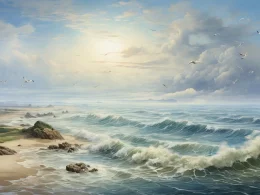Prosperity cannot last long;
Rise and fall alternate their song.
Lotus flowers bloom after spring,
But autumn will lotus seed bring.
When grass is bitten by hoar frost,
The lotus withers, though not lost.
Sun and moon set and again rise;
None can revive after he dies.
From olden memories awoken,
Oh, how could my mind not be broken!
Original Poem
「杂诗 · 其三」
陶渊明
荣华难久居,盛衰不可量。
昔为三春蕖,今作秋莲房。
严霜结野草,枯悴未遽央。
日月有还周,我去不再阳。
眷眷往昔时,忆此断人肠。
Interpretation
Miscellaneous Poems III was composed in 414 AD when Tao Yuanming was fifty years old. Having long resigned from officialdom and retreated from worldly bustle, he increasingly felt the melancholy of time's passage and life's impermanence amidst his tranquil existence. Observing the flourishing and withering of plants in nature, the poet realized human life resembles blooming and fading flowers - its glory and decline equally unpredictable - expressing profound lament over irretrievable passing youth and life.
First Stanza: "荣华难久居,盛衰不可量。"
Róng huá nán jiǔ jū, shèng shuāi bù kě liáng.
Splendor cannot long endure,
Growth and decay none can measure.
The opening directly states life's impermanence, highlighting nature's laws and life's inevitable cycles beyond human control.
Second Stanza: "昔为三春蕖,今作秋莲房。"
Xī wéi sān chūn qú, jīn zuò qiū lián fáng.
Once lotus blooms in spring's prime,
Now autumn's seedpod in time.
Using lotus flowers' transformation from bloom to withering as metaphor for human life's natural progression from youth to old age.
Third Stanza: "严霜结野草,枯悴未遽央。"
Yán shuāng jié yě cǎo, kū cuì wèi jù yāng.
Frost binds wild grasses sere,
Though not completely austere.
Depicting nature's tenacious vitality - even in withering, life struggles - mirroring human twilight years.
Fourth Stanza: "日月有还周,我去不再阳。"
Rì yuè yǒu huán zhōu, wǒ qù bù zài yáng.
Sun and moon cycle without rest,
My departure knows no sunrise west.
Contrasting celestial cycles with human mortality, lamenting life's irreversibility.
Fifth Stanza: "眷眷往昔时,忆此断人肠。"
Juàn juàn wǎng xī shí, yì cǐ duàn rén cháng.
Longingly recalling days past,
Such memories rend heart steadfast.
Directly expressing endless nostalgia for bygone youth and present profound grief.
Holistic Appreciation
Through nature's cyclical changes, this poem mirrors life's inevitable progression from prosperity to decline. The contrast between spring lotuses and autumn seedpods vividly illustrates youth's transience and aging's inevitability. Frost-stricken grass and celestial cycles become catalysts for meditations on mortality. Profound yet simply worded, with unadorned strokes it captures life's irreversible sorrow. Tao Yuanming's calm observation and deep insight blend personal experience with universal natural laws, creating transcendent yet heartfelt philosophical beauty.
Artistic Merits
The poem employs nature's cycles as symbols for life's impermanence, perfectly fusing scene and emotion. Through lotus transformations, frost-bitten grass and celestial motions, it evokes infinite lament for life's brevity and vanished youth. Simple language rich with philosophy and feeling demonstrates Tao's unique style - profound depth beneath surface calm, melancholy within naturalness. Its plain narration contains deep life experience and understanding of natural laws, endowing the poem with unadorned yet genuine power.
Insights
This poem enlightens us that human life resembles flowers blooming and fading - prosperity and decline follow nature's course. Facing irreversible time and aging, we should maintain clarity and composure. At each life stage, we must cherish present moments - neither lamenting past glory nor fearing unknown futures. As Tao Yuanming shows, while accepting life's impermanent nature, preserving nostalgic gratitude for beautiful years becomes life's most heartfelt response.
Poem translator
Xu Yuanchong (许渊冲)
About the poet

Tao Yuanming(陶渊明), 365 – 427 CE, was a poet, literary figure, fu writer, and essayist active during the late Eastern Jin and early Liu Song dynasties. Born in Chaisang (near present-day Jiujiang, Jiangxi Province), he pioneered a new genre of pastoral-themed literature, expressing profound philosophical insights through simple language. His poetic style became an enduring aesthetic standard in classical Chinese poetry.












